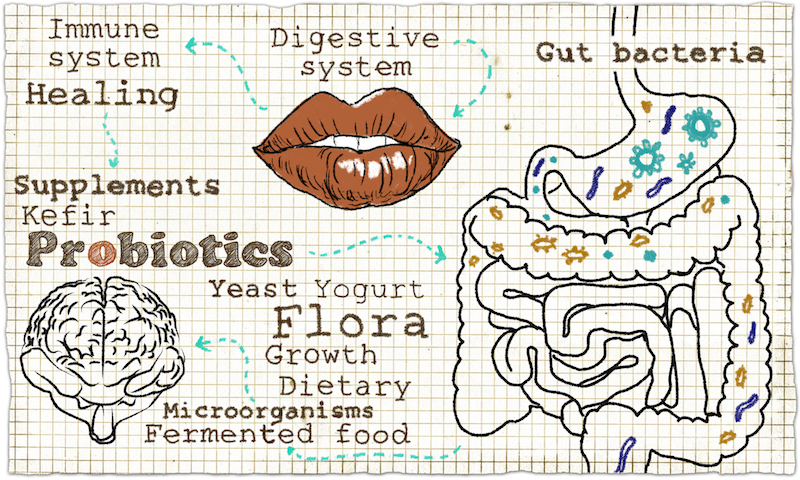The Gut Flora–Disease Connection
There has been an increasing amount of talk about the connection between our healthy gut flora and disease.
Dr Leila Masson reports on this critical research…

Gut Flora is Linked to Mood
Recently the research has widened to include the effect on behavior, mood, and feelings. Two recent studies reflect the critical role the gut-brain connection plays in children.
Article 1:
Toddler Tantrums May be Due to Their Gut Flora
Gut Bacteria and Happiness
In this first study, scientists found that toddlers with the highest variety of gut bacteria were more likely to be happy, curious, sociable and impulsive (I imagine positively!). In boys, extroverted personality traits were associated with the abundance of specific microbes. (Click the link below to find out which ones).
How to achieve a highly-diversified healthy gut flora
Healthy humans have up to 500 different species of bacteria, many viruses, and even parasites in their guts. Our modern lifestyle, however, has a negative influence on our gut flora. It reduces the variety of the flora, and this allows overgrowth of disease-causing bugs. So what can we do to help our children grow a healthy gut flora?
Simple things you can do to improve gut flora:
- Eat fermented foods such as yogurt (can be non-dairy), kefir (I love coconut kefir), sauerkraut, kimchi, pickles daily
- Eat lots of vegetables (5+ servings), as bacteria use the fiber in the veggies to grow.
- Avoid unnecessary antibiotics and if your child needs these give a course of a multi-strain probiotic for a month afterwards.
- Pregnant mothers should take probiotics to prepare healthy flora for the birth. If possible give birth vaginally as the baby swallows the mother’s bacteria on the way out.
Babies born by caesarian section have an entirely different, unhealthy flora that has nothing to do with gut flora but resembles the skin flora of the hospital workers. - Breastfeed if at all possible as there are specific growth factors for the beneficial bifidobacter bacteria that are the leading group of healthy bacteria in infants. If you cannot breastfeed, try to get human milk from a milk bank.
- Avoid too much disinfection – do not use antibacterial soaps.
- Let your child play in the dirt and with dogs. Children who grow up with dogs are healthier, not just because they get huge portions of love, but also because the dog’s kisses come with a big dose of bugs that train the child’s immune system.
Article 2:
Autism Symptoms Improved with Faecal Transplants
In the second study children with autism received fecal transplants. The results showed improvements in their gastrointestinal problems and their autism behaviors.
Resolving Gut Issues in Children with Autism
Integrative and functional doctors have been addressing gut issues in children with autism for years. They found that as the diarrhea or constipation resolved, the children became more interactive, less aggressive, happier, and even spoke and communicated more.
Autism guidelines in the US and NZ recommend that every child on the autism spectrum be assessed. If needed, they should be treated for gastrointestinal problems, such as inflammation, constipation, and diarrhea.
Different Gut Bacteria in Children with Autism
The gut flora of children with autism is in general entirely different from neurotypical (normal) children. They have:
- Less variety of bacteria
- Various kinds of bacteria
- Higher numbers and more types of clostridia bacteria
These clostridia produce a chemical called propionic acid, which gets absorbed into the bloodstream and can reach the brain. When researchers injected this into the brains of mice, the mice started to act autistically. When children with autism and clostridia were treated with antibiotics for the clostridia, their behavior became more neurotypical.
Microbiome Research is Booming – the Gut Flora–Disease Connection
I find this fascinating. Microbiome research is booming right now, and scientists are investigating the connection of abnormal gut flora and various diseases, including:
- Autism spectrum disorders
- Crohn’s disease
- Parkinson
- Alzheimer’s
The gut flora appears to play a role in these and many other illnesses that were never thought to be associated with the gut.
Do Whatever it Takes to Achieve Healthy Gut Flora
This means that we need to do anything–and–everything we can to help our children grow a healthy gut flora with a great variety of bacteria. In the United States and New Zealand, the guidelines for treating children with autism include the recommendation to assess each child on the spectrum for gastrointestinal problems, as the rate is so high. The pain and inflammation caused by digestive issues can result in behavioral difficulties that cannot be improved by behavioral approaches. They only respond with appropriate treatment of the gut issues and pain. Hopefully, Australia will follow suit soon and include this recommendation in the national autism guidelines.
About Dr Leila Masson

Dr Leila Masson is an integrative pediatrician who combines Western medicine with a nutritional, environmental and biomedical approach to help her patients attain optimal health.
References:
Article 1 Toddler tantrums may be due to their gut flora
Article 2 Autism symptoms improved with fecal transplants
- Lisa M. Christian, Jeffrey D. Galley, Erinn M. Hade, Sarah Schoppe-Sullivan, Claire Kamp Dush, Michael T. Bailey. Gut microbiome composition is associated with temperament during early childhood. Brain, Behavior, and Immunity, 2015; 45: 118 DOI: 10.1016/j.bbi.2014.10.018
2. Kang, Dae-Wook, James B. Adams, Ann C. Gregory, Thomas Borody, Lauren Chittick, Alessio Fasano, Alexander Khoruts, et al. 2017. “Microbiota Transfer Therapy Alters Gut Ecosystem and Improves Gastrointestinal and Autism Symptoms: An Open-Label Study.” Microbiome 5 (1): 10.
http://microbiomejournal.biomedcentral.com/…/s40168-016-022… - Buie T et al. Evaluation, Diagnosis, and Treatment of Gastrointestinal Disorders in Individuals With ASDs: A Consensus Report. Pediatrics Jan 2010, 125 (Supplement) S1-S18; DOI: 10.1542/peds.2009-1878C
- New Zealand Autism Spectrum Disorder Guideline http://www.health.govt.nz/publication/new-zealand-autism-spectrum-disorder-guideline



